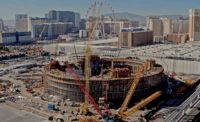Construction is still underway on most projects throughout the Southwest.Here's a state-by-state update.
Nevada
The state of Nevada, placed under a mandatory shelter-in-place order by Gov. Steve Sisolak (D) until April 30, has closed all hotels and resorts, including mega-casinos on the Las Vegas Strip.
“The entire Strip is shutdown (in terms of hospitality and retail). It’s eerie,” says Tony Illia, spokesman for the Nevada Dept. of Transportation. “There have been a cascade of cancellations for conventions and meetings. It’s a real gut check for the city, since that’s our lifeblood,” he adds.
However, construction continues on most Las Vegas-area projects, including the $1.9-billion, 65,000-seat Allegiant Stadium near the Strip, even though a jobsite worker tested positive for the virus. The stadium is still scheduled to open in late summer.
Work on the estimated $1.5-billion MSG Sphere, also in Las Vegas, has been suspended for at least two weeks by the owner, Madison Square Garden Co. The company’s board, in a March 31 statement, cited “significant impediments” to the project that would make continuation of work too difficult during the pandemic. Completion will be delayed until after 2021.
Meanwhile, all NVDOT projects are still moving ahead. In fact, Illia says highway crews have been able to accelerate work in some areas, because the lighter traffic allows them to work during daytime closures as well as at night. He says the agency may even be able to move some future projects up in the bidding queue.
Arizona
Construction in Arizona has been designated an essential business, and work continues on nearly all projects that are already underway, says Tom Dunn, president of the Arizona Builders Alliance in Phoenix.
But many future projects, especially those planned to start six to eight months out, have been postponed, Dunn says. “But we think those delays, for the most part, are only temporary.”
There have been no reports of jobsite workers testing positive for the virus thus far, he says.
Meanwhile, Arizona contractors struggle to keep their projects going while adhering strictly to federal and state guidelines.
“We are continuing to work under these highly unusual circumstances—building critical infrastructure such as hospitals, schools, roadways, water treatment plants, manufacturing sites, government facilities and more,” Sundt Construction CEO/President G. Michael Hoover said via email. “As we work, we are taking exceptional care to safeguard our people and help slow the spread of the virus in our communities.”
He says the firm’s COVID-19 Task Force meets daily to monitor progress and update plans to keep jobsites safe. “We are taking exceptional care to safeguard our people and help slow the spread of the virus in our communities. Our COVID-19 Response Plan is built on recommendations from the CDC and other public health officials.”
Steve Whitworth, president of Kitchell Contractors, said via email: “We immediately instituted policies to reinforce safety amidst this outbreak. … Our trade partners have been very diligent following these policies, and we have encountered minimal disruptions on active projects.”
He says his firm has a thorough screening process in place in accordance with CDC guidelines. “We are closely monitoring supply chain issues and are in the process of assisting two health care systems with their preparations.
“Overall, there is no playbook for this situation, so we are doing our best to mitigate every risk and communicate to our teams as much as possible,” Whitworth adds.
New Mexico
On March 23, New Mexico Gov. Michelle Lujan Grisham issued an a statewide stay-at-home order, under which construction was specified as an essential business, "including, but not limited to, public works construction; commercial and residential facility construction and maintenance; [... and] those attendant to the repair and construction of roads and highways."
In a letter to Lujan Grisham, also on March 23, AGC of New Mexico CEO Kelly Roepke-Orth said that "explicit exemptions for commercial construction are needed to continue critical infrastructure projects such as ongoing construction of schools, hospitals and businesses which could result in significant disruptions for the essential services, or work that is required due to a disaster, such as clearing out building damages due to fire. Further, the abandonment of some active construction sites in an effort to send crews home may in and of itself create an unnecessary public health threat."





